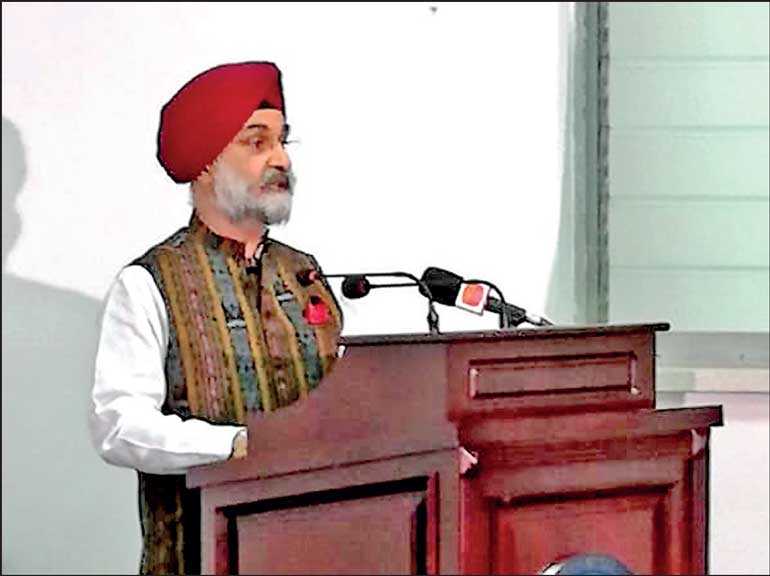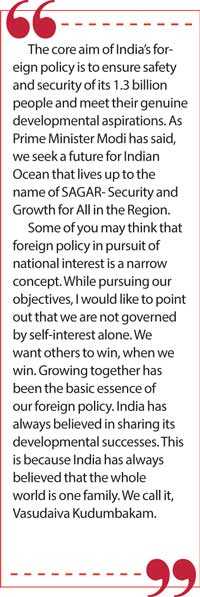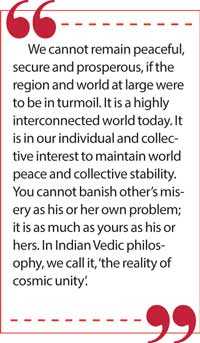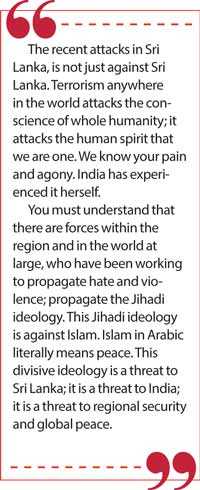Wednesday Feb 18, 2026
Wednesday Feb 18, 2026
Wednesday, 12 June 2019 00:00 - - {{hitsCtrl.values.hits}}

Indian High Commissioner to Sri Lanka Taranjit Singh Sandhu delivered the keynote address at the inauguration of the Bandaranaike International Diplomatic Training Institute’s (BDTI) 21st Diploma in Diplomacy & World Affairs Course recently. BDTI Director General Ambassador Pamela Deen and Ministry of Foreign Affairs of Sri Lanka DG (East Asia, South Asia and Oceania Division)
Damayanthi Rajapakse were among officials present at this occasion. Following is the full text of the High Commissioner’s address:
I am happy to be here today at the Bandaranaike International Diplomatic Training Institute for the inauguration of  the 21st Diploma Course in Diplomacy & World Affairs. I have been meaning to be here for a while now; however, it had to be postponed a couple of times. Director General Pamela Deen has been a longstanding friend. I congratulate Ms. Deen on her active role in taking BIDTI forward.
the 21st Diploma Course in Diplomacy & World Affairs. I have been meaning to be here for a while now; however, it had to be postponed a couple of times. Director General Pamela Deen has been a longstanding friend. I congratulate Ms. Deen on her active role in taking BIDTI forward.
You are today starting the 21st Diploma Course in Diplomacy and World Affairs. I am confident that it would equip you to appreciate the 21st century challenges in International Affairs.
This is my first public function in Sri Lanka, after our new Government has taken over in India. As you are aware, the President of Sri Lanka attended the swearing-in ceremony last week, along with other world leaders. It is a proud moment for humanity who believe in the strength of democracy; the people of India chose PM Modi, making him not only the leader of the largest democracy in the world, but also a leader with the largest popular mandate in the world.
The decisive mandate for PM Modi is a reflection of support for continuation of the Government’s policies, and has led to a stable Government. India-Sri Lanka relations have seen landmark changes in the last five years, with PM Modi’s 2 visits to the island, and substantial strengthening of economic pillar of the relationship. The continuation and further strengthening of these policies is also in Sri Lanka’s interest.
I am glad that today’s inaugural function also provides an opportunity for me to interact with the youth in Sri Lanka. India and Sri Lanka are ancient civilisations, but nations of youth. I have always believed in the power of youth; the power to think out of the box; the power to innovate; and the power to look into the future rather than the past. In you, I see hope and freedom; in you, I see confidence and resilience; in you, I see a better tomorrow.
Today, I would briefly touch upon India’s foreign policy with special emphasis on national security. I would also briefly speak about India-Sri Lanka relations.
What is the primary objective of India’s foreign policy? In other words, what are we trying to achieve through our engagement with other countries? The core aim of India’s foreign policy is to ensure safety and security of its 1.3 billion people and meet their genuine developmental aspirations. As Prime Minister Modi has said, we seek a future for Indian Ocean that lives up to the name of SAGAR- Security and Growth for All in the Region.
Some of you may think that foreign policy in pursuit of national interest is a narrow concept. While pursuing our objectives, I would like to point out that we are not governed by self-interest alone. We want others to win, when we win. Growing together has been the basic essence of our foreign policy. India has always believed in sharing its developmental successes. This is because India has always believed that the whole world is one family. We call it, Vasudaiva Kudumbakam.
How do you ensure safety and security of your citizens and take your country forward on its development path? It is a live question today in Sri Lanka, after the dastardly terrorist attacks in April that killed hundreds of innocent people. It is a question which world leaders are trying to grapple with, almost every day.
First and foremost, we must understand that we cannot remain peaceful, secure and prosperous, if the region and world at large were to be in turmoil. It is a highly interconnected world today. It is in our individual and collective interest to maintain world peace and collective stability. You cannot banish other’s misery as his or her own problem; it is as much as yours as his or hers. In Indian Vedic philosophy, we call it, ‘the reality of cosmic unity’.
There was a time when the rulers guarded physical borders. Even now we do it. What has changed now is that, these physical border security measures are not enough. Internet and cyberspace have revolutionised the way we think and act. While digital age, technology and social media have brought  humanity together, it has also become a potential weapon for spread of aggression and intolerance. Irrespective of the actual location of individuals, ideas and ideologies travel beyond borders, on a real time basis. Terrorism and Extremism are complex challenges. Collective threats and challenges demand collective action.
humanity together, it has also become a potential weapon for spread of aggression and intolerance. Irrespective of the actual location of individuals, ideas and ideologies travel beyond borders, on a real time basis. Terrorism and Extremism are complex challenges. Collective threats and challenges demand collective action.
The recent attacks in Sri Lanka, is not just against Sri Lanka. Terrorism anywhere in the world attacks the conscience of whole humanity; it attacks the human spirit that we are one. We know your pain and agony. India has experienced it herself.
You must understand that there are forces within the region and in the world at large, who have been working to propagate hate and violence; propagate the Jihadi ideology. This Jihadi ideology is against Islam. Islam in Arabic literally means peace. This divisive ideology is a threat to Sri Lanka; it is a threat to India; it is a threat to regional security and global peace.
We cannot talk about the danger of snakes and walk over the pits, and expect them not to bite us. We need to walk the talk. We need to identify the snake-pits and isolate them. We need to find out who nurtures these snake-pits, and close those channels.
We have to strive together to ensure that such heinous crimes are never repeated. We need to clearly understand what happened, for which we require focused action. Any attempt to divert attention from the core issue will only be self-defeatist.
Counter-terrorism and countering violent extremism and radicalism are of equal importance. "Since wars begin in the minds of men, it is in the minds of men that defences of peace must be constructed,” says the preamble to the Constitution of UNESCO. The most important tool available for us is education. Education is not just about what is taught in class-rooms. Education is about what you read, books and digital; who your friends are; what your  families and communities teach you. Love and tolerance are virtues which can be nurtured only in the waters of togetherness. Alienation, compartmentalisation and hierarchy of identities provide fertile soil to breed hate and violence.
families and communities teach you. Love and tolerance are virtues which can be nurtured only in the waters of togetherness. Alienation, compartmentalisation and hierarchy of identities provide fertile soil to breed hate and violence.
For India, pluralism and diversity call for celebration and not confrontation. India is not only the world’s largest democracy but also the world’s most intricately pluralistic society. India has been able to preserve this rich mosaic of pluralism under democratic structures. We firmly believe in taking everyone along in our journey towards development. Sabka Saath, Sabka Vikas, Sabka Vishwas, which means Solidarity with everyone, development for all.
India is Sri Lanka’s closest neighbour. We are both ancient civilisations; pluralistic societies; most importantly democracies. We share similar aspirations and face common challenges. Countries, like individuals, need to look ahead. The first day of PM Modi in office after the swearing in ceremony was dedicated to meeting the leaders from the neighbourhood and extended neighbourhood. It is a reflection of the importance that we attach to the special relations with our neighbours.
Prime Minister Modi is scheduled to visit Sri Lanka this weekend. PM Modi will be the first foreign leader to visit Sri Lanka after the Easter attacks. He will carry the message of solidarity and hope from people of India to the people of Sri Lanka.
Our relationship with Sri Lanka is without any caveats and riders. It is open and genuine. India is not interested in capturing Sri Lanka’s assets, resources or markets. We are only interested in seeing a united, peaceful, strong, sovereign and prosperous Sri Lanka. Our future will be shaped by what we do today, how quickly we do it and how strongly we feel for it. There is no space for ambivalence or complacence. India stands with you in the hour of need.
 Sri Lanka may now have friends who show Sri Lanka great dreams, or encourage Sri Lanka to see things through their lens. But, if there is one friend that Sri Lanka has, who has given information when it mattered the most; who was the first to send ships with men and material when floods hit Sri Lanka; who have offered development assistance for several people-oriented projects as per Sri Lanka’s own priorities; and some of them spread island-wide; who stood with Sri Lanka in rain and in shine; my young friends, have no doubt, it is India.
Sri Lanka may now have friends who show Sri Lanka great dreams, or encourage Sri Lanka to see things through their lens. But, if there is one friend that Sri Lanka has, who has given information when it mattered the most; who was the first to send ships with men and material when floods hit Sri Lanka; who have offered development assistance for several people-oriented projects as per Sri Lanka’s own priorities; and some of them spread island-wide; who stood with Sri Lanka in rain and in shine; my young friends, have no doubt, it is India.
There is also a narrative which we increasingly hear that India is trying to balance the influence of a third country in Sri Lanka. Out actions speak for themselves. Our relations with Sri Lanka stand on its own and are not dependent on our relations or Sri Lanka’s relations with any third country.
Your decisions today, my friends, should not be coloured by what others say, or by analyses of the past where we no longer live, but must be based on Sri Lanka’s own interests and your vision of how you wish to see Sri Lanka in the decades ahead. We will continue to be with you, come what may.
As Lord Buddha said, “No one saves us but ourselves. No one can and no one may. We ourselves must walk the path.”